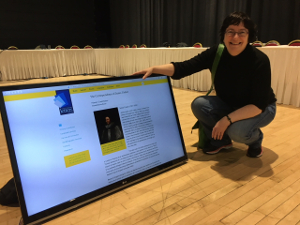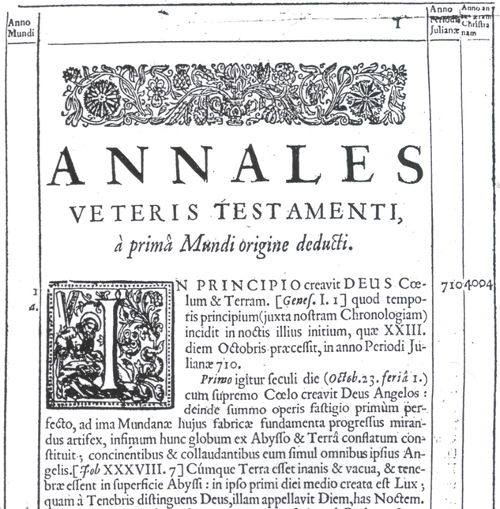At first glance, Valletta might not be where you would expect to stumble across one of Trinity College Dublin‘s greatest scholars. Yet this week, at the University of Malta’s Valletta campus, we are privileged indeed to encounter James Ussher, the Church of Ireland Archbishop of Armagh between 1625 and his death in 1656, together with records for the 681 letters that make up his surviving correspondence. The listing for his correspondence is the latest to be released into the EMLO union catalogue, and the reason the archbishop is in Malta could not be more apposite as this publication coincides with the convergence of large numbers of early modern scholars at the third and concluding conference arranged by the COST Reassembling the Republic of Letters Action.

Dr Boran preparing to launch her catalogue of James Ussher’s correspondence in EMLO at the University of Malta, Valletta, 31 January 2018. (Image courtesy of Arno Bosse)
James Ussher was a towering figure across Ireland, England, and Europe throughout the first half of the seventeenth century. His correspondence has been edited and published (Irish Manuscripts Commission [IMC], 2015) in an exemplary three volume edition by Dr Elizabethanne Boran — herself of TCD — who is Librarian of the Edward Worth Library and the scholar behind The Ussher Project. To quote Dr Boran, ‘Ussher’s correspondence reflects his political and ecclesiastical role as the head of the church in Ireland at a crucial time of forging its identity as a separate enclave from the Church of England while his scholarly network reveals his pivotal role in Irish, British and European intellectual life.’
Ussher’s correspondents are to be found the length and breadth of the continent, and he exchanged letters with a large number of the leading scholars of his age. It is entirely fitting that Ussher’s catalogue in EMLO should be launched at this conference with a wide range of European early modern scholars and digital technology specialists in attendance. Dr Boran chairs a working group within the Action entitled Documents and Collections which investigates how best to describe a shared data model that captures both common definitions of the genres of the letter and its physical features. The discussions and presentations at the conference focus on preparing the publication of a ‘blueprint’ for a radical open-access, open-source, transnational digital infrastructure which will be capable of enabling and supporting the multilateral collaboration required to reassemble the scattered documentation of the early modern communities that made up the ‘respublica literaria’.

Detail of a page from ‘Annales veteris testamenti’ (1650). (Source of image: Wikimedia Commons)
Ussher, who contributed to the scholarly conversation of his age in no small measure with his 1650 publication Annales veteris testamenti, in which he published his calculation of the date of God’s creation of the universe (he placed it at 23 October 4004 B.C.), was a figure who transcended successfully significant religious divide: despite his English royalist allegiance, the archbishop was given a state funeral by Oliver Cromwell in London’s Westminster Abbey. To quote Dr Boran, Ussher ‘might be appropriated by both royalist and parliamentarian, puritan and anglican. In the world of scholarship his identity was clearer: he was, in the words of John Selden, “learned to a miracle”.’ Enjoy his correspondence!
